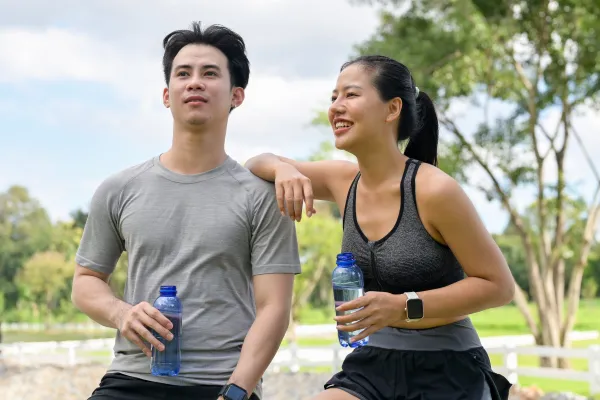Topics
An Overview of Stroke and Its Effects on Younger Individuals
A stroke is a severe medical condition that results from the disruption of the blood supply to a part of the brain, caused by a blockage or a blood vessel rupture. These can cause the brain cells to be deprived of oxygen, leading them to die, impacting the body’s functions controlled by that part of the brain. Although older adults are more commonly linked to strokes, the incidence of strokes among younger people is becoming increasingly common. Cases of stroke in younger individuals have been increasing around the world, and Malaysia is included as well. At Gleneagles Hospital, one of the region’s top healthcare providers, more young patients are seeing specialists to seek treatment for strokes. It is important to note that younger people who are below 45 are still vulnerable to strokes and should be informed about the risk factors and symptoms to ensure early medical intervention.
Common Causes of Stroke in Younger Individuals
There are a few underlying factors that may cause strokes in younger individuals, and some of these are preventable. Although conditions such as high blood pressure and diabetes are regularly linked to older people who have strokes, strokes in younger individuals can occur due to different factors. Knowing these causes can help with stroke prevention.
Genetic Factors
Hereditary medical conditions can play a notable role in elevating the risk of stroke at a young age. Some younger individuals have genetic clotting disorders like Factor V Leiden or antiphospholipid syndrome, which increases the risk of forming fatal blood clots that can move to the brain, obstructing blood flow.
Lifestyle Choices
The risk of stroke can increase through a poor lifestyle. Smoking is a huge risk factor, as it damages blood vessels and elevates the possibility of clots. Overconsumption of alcohol can cause high blood pressure, which increases the risk of stroke in return. An unhealthy diet, especially one rich in saturated fats, can contribute to obesity and heart disease, both of which elevate the possibility of getting a stroke.
Warning Signs of Stroke in Younger Individuals
A stroke can occur abruptly; however, if you recognise the signs and symptoms early, this can lead to prompt medical treatment and decrease the risk of permanent damage.
Abrupt Weakness or Numbness
One of the most obvious signs of a stroke is abrupt weakness or numbness in the face, arm, or leg, normally on one side of the body. This condition can make it challenging to talk or move, and prompt medical attention is needed.
Trouble Speaking or Comprehending Speech
There is another main symptom of stroke in younger individuals, which is difficulty speaking or comprehending speech. These people may have trouble pronouncing words properly, slurring their words, or struggling to understand what others are saying.
Serious Headache
An abrupt, serious headache with no clear cause can also be a sign of stroke. Nausea, vomiting, or dizziness may accompany the headache, which can further indicate that a stroke is happening.
It is crucial to act swiftly if you have caught any of these signs. The quicker a stroke is treated, the better the chances.
Preventing Stroke in Younger Individuals
There is no doubt that prevention is better than cure, and although strokes are sometimes avoidable in younger individuals, the risk of stroke can still be reduced through taking several proactive measures.
One of the most effective ways to prevent a stroke is a healthy lifestyle. Frequent exercise, such as walking, swimming, or cycling, aids in keeping a healthy weight and decreases blood pressure. Eating a balanced diet full of fruits, vegetables, whole grains, and lean proteins can enhance general heart health. Stopping smoking and overconsumption of alcohol also greatly contributes to preventing strokes.
Lastly, younger individuals should constantly consult a medical professional before taking medications, as specific drugs can elevate the risk of clotting or bleeding.
FAQs about Stroke in Younger Individuals
1. Can a stroke happen abruptly in younger individuals?
Yes, some strokes can occur abruptly, and not everyone exhibits the usual warning indicators. However, many strokes do show initial symptoms such as abrupt numbness, changes in vision, or trouble speaking. It is important to act swiftly when these symptoms show up.
2. Does stroke happen more commonly in specific age groups?
Although strokes are more prevalent in older people, the incidence in younger individuals is increasing. Individuals under 45 can still have a stroke, specifically if they have underlying health conditions, such as heart disease, high blood pressure, or genetic factors that make them more susceptible.
3. What part does genetics play in a young person's risk of stroke?
Genetic factors can notably influence the risk of developing stroke. Hereditary clotting disorders or vascular conditions can cause younger individuals to have a higher likelihood of experiencing a stroke despite maintaining a healthy lifestyle. Frequent screenings can help in catching these risks early.
4. How can heart specialists in KL help young people avoid developing a stroke?
Heart specialists in KL can determine an individual’s risk for stroke by performing tests to find any unidentified conditions such as high blood pressure, diabetes, or heart disease. They can also recommend lifestyle adjustments, medications, or treatments to decrease the risk of getting a stroke.
5. Can younger individuals fully heal from a stroke?
A stroke recovery depends on a few factors, including the stroke’s severity, how swiftly treatment was given, and the person’s health. Many younger individuals can fully heal with proper rehabilitation and support from medical professionals.
Schedule an Appointment at Gleneagles Hospitals
A stroke is a severe medical condition that can have persistent effects on your health. If you or a loved one has any symptoms or concerns regarding your stroke risk, you should not wait. Early diagnosis and intervention are important in decreasing the impact and enhancing recovery outcomes.
At Gleneagles Hospitals, our professional team of heart specialists in KL and neurologists is here to offer comprehensive care throughout your treatment journey. From early consultations to advanced treatments and rehabilitation, we provided tailored solutions to help you manage your health and avoid further complications.
You should not wait for a stroke to strike; instead, take the first step towards a healthier, safer future by scheduling an appointment via our website or downloading the MyHealth360 application via the Google Play Store or Apple App Store. Our dedicated team is here to support you every step of the way.








